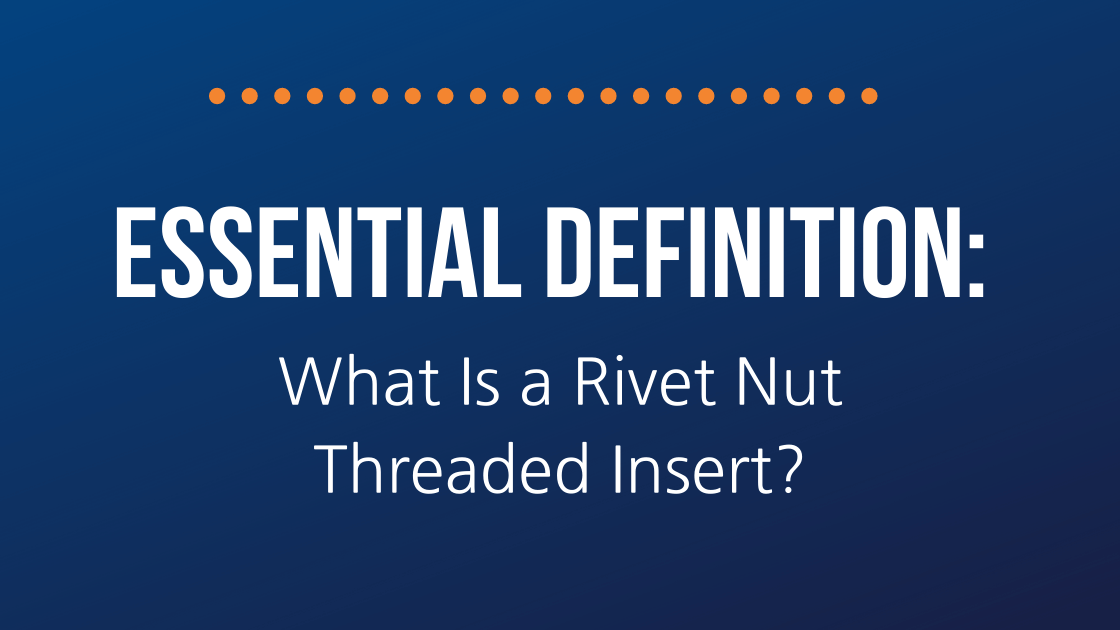
Threaded inserts are one of the most versatile types of fasteners available, partly because they are available in so many different types and materials. When you need to create a lasting bond in a thin, soft, or brittle material, threaded inserts are your best option.
Threaded inserts were originally designed in the 1930s by B.F. Goodrich to affix deicers to airplane wings. The challenge was that because the wings were made of thin, light aluminum, they couldn’t accommodate conventional tap holes—when builders tried to insert a screw or bolt, the material was too thin and soft to hold the thread. The solution was to insert a threaded sleeve that could be securely fashioned to the aluminum and serve as a secure anchor for a bolt or screw.
The concept behind the threaded insert is simple but ingenious. If you have thin material, such as sheet metal, or soft material, such as wood or plastic, then you can install a threaded insert into a pre-drilled hole and secure it in one of two ways.
For thin materials, the insert or rivet nut is pushed through the workpiece and secured on the other side by either expanding the insert to create a flange or pulling the insert back into itself to hold it in place in the hole. For thicker materials, such as wood, you can use an insert with an exterior pattern or shape that fits securely in the material and will not turn when a bolt is inserted.
What Is a Rivet Nut Threaded Insert?

There are many occasions when you encounter material that is either too thin or too soft to accommodate a conventional tapped hole, or a tapped hole that has stripped. Rivet nut threaded inserts solve the problem quite elegantly, but you need to understand what type of threaded insert is best for a particular job.
A rivet nut threaded insert is basically a cylindrical or hex-shaped sleeve that is internally threaded to accommodate a mating bolt or other type of threaded fastener, creating a threaded hole. The sleeve itself fits securely in the tap hole using various methods so the fastener won’t turn. Once installed, rivet nut threaded inserts provide a strong receptacle for a threaded fastener. In fact, they often are used in joints that are frequently assembled and disassembled to prevent stripping the bolt hole.
Threaded inserts are used in a wide range of applications. For example, in addition to airplane manufacturing, they are used in automobile manufacturing to fasten body parts together or attach molding and for body repairs. They are used in consumer electronics to fasten together plastic components or to secure circuit boards, and in boatbuilding to secure fiberglass and to create waterproof joins. For furniture making, threaded inserts are ideal to secure soft wood parts. Any application for which you need a strong join can benefit from a threaded insert. They also are commonly used to repair stripped holes.
The Four Primary Types of Inserts
Although threaded inserts come in all materials and sizes, there are four basic types of insert design:
- Thick-wall inserts: As the name suggests, thick-wall inserts are used in thicker materials. They are typically tubular with a threaded interior, although they also come in hexagonal configurations to prevent turning in the hole. These are also blind inserts because they can be installed from one side of the parent material without having to access the other side. Thick-wall inserts are available with either flat or countersunk heads, and they come in open- and closed-end designs. Closed-end inserts are useful for applications where leaking or corrosion could be an issue. Additionally, these inserts come in various materials, including steel, stainless steel, aluminum, and alloy-hardened steel, either with keyed or non-keyed heads.
- Thin-wall inserts: Similar to thick-wall inserts, thin-wall inserts come in round and hexagonal shapes, as well as semi-hex and knurled body types. They also have closed-end designs with weather-resistant plating for special applications. Thin-wall inserts also tend to have a wide-bearing head to create a stronger bond. Nutserts are a specific type of round thin-wall insert with a low-profile flange for near-flush applications. To install a nutsert, you place it in a pre-drilled hole, and as the bolt is tightened, the outer body is pulled into the inner body to create a firm bond.
- Slotted-body, wide-tail formation inserts: Slotted-body inserts have a different type of design with cuts in the body of the insert that collapse on the blind side to form a strong connection. They come in a straight shank version, which is ideal for soft materials such as wood and composites, and in a pre-bilged version, which works well with thin materials such as plastics and metals.
- Euro-style inserts: Some applications require metric threading, which is why there are Euro-style threaded inserts. Euro-style inserts are similar to other types of inserts and available in round, hexagonal, semi-hex, and square body types. They are often used for repairs or to convert from standard to metric threading.
Specialty Threaded Inserts for Unique Applications
Although the four standard types of threaded inserts are the most commonly used in manufacturing and assembly work, there are other types of insert designs that have proven useful for specific types of applications:
- Wellnuts are a specific type of rivet nut threaded insert usually made of rubber or some other soft material. They are commonly used to create sealed joints or to prevent loosening from vibration. The wellnut is flanged at one end where the bolt is inserted, and as the bolt is tightened, the insert expands to hold the insert securely in place while creating a seal. Wellnut inserts are often used in boatbuilding and automotive applications.
- Jack nuts are commonly used with especially thin or brittle material. They are slotted and have a wide head to prevent pull-through. When they are installed, they create a large umbrella-like footprint on the blind side of the material. They look similar to and perform like sheetrock anchors, sometimes referred to as Molly anchors. The Molly jack nut is ideal for use in an assembly line and can be installed by hand or using power tools without affecting thinner materials. They are available in steel, brass, and coated steel and can be installed by hand.
- RIV-FLOAT® inserts are made by Sherex Fastening Solutions and are designed to accept threaded fasteners that may not be perpendicular to the face of the installed insert. They have a unique "floating" internal threaded sleeve that pivots to accommodate misaligned parts. The RIV-FLOAT insert has a diagonal insert so a bolt can be inserted and firmly connected through misaligned holes.
Different Inserts Accommodate Different Materials
The reason there are so many types of rivet nut threaded inserts is that they are used for a wide range of applications with different types of materials.
Plastics, for example, tend to be soft and brittle, but often need a fastener that can withstand assembly and disassembly multiple times. Jack nut inserts are commonly used because they have a wide footprint and create a strong insert without damaging the plastic. Fiberglass presents a similar challenge; jack nuts are frequently used for thin sheets of fiberglass, but for thicker sheets, such as those used in boatbuilding, knurled inserts provide a solid joint and wellnut inserts create a vibration-proof and waterproof joint.
Tapped holes in soft woods such as pine tend to strip, but using a rivet nut threaded insert can repair a stripped hole or create an anchor for a firm joint. Stud inserts, such as those used in making furniture, are also used to create a secure threaded stud that can accept a nut.
Thick-wall inserts are often used with metal, though slotted body inserts are typically used for thin sheets of metal. For softer metals such as aluminum, aluminum inserts and slotted body inserts are frequently used.
Rivet nut threaded inserts are used in concrete for construction applications. You will usually find thick-walled inserts and stud-style inserts used in concrete foundations and structures.
When buying rivet nut threaded inserts, you will likely encounter the four most popular insert brands: Atlas Engineering, Avdel/STANLEY, Sherex Fastening Solutions, and AVK Industrial Products. These four vendors manufacture a variety of rivet nut threaded inserts for all applications and have proven track records of quality and reliability. They also offer complete lines of installation tools that are paired with each specific style of insert to ensure correct installation.
These are some of the different types of threaded inserts available, and this information can help you choose the best threaded inserts for your specific application. You can find inserts for jobs of any size and holes of any diameter. Additionally, there are materials for special applications, such as brass and aluminum that won’t corrode, or non-conductive inserts for electronic applications. If you’re looking for guidance in choosing the right threaded insert, contact one of our industry-experienced experts who can help you find the perfect parts for your next job.
This blog was originally published April 2019 and updated May 2020.



Comments